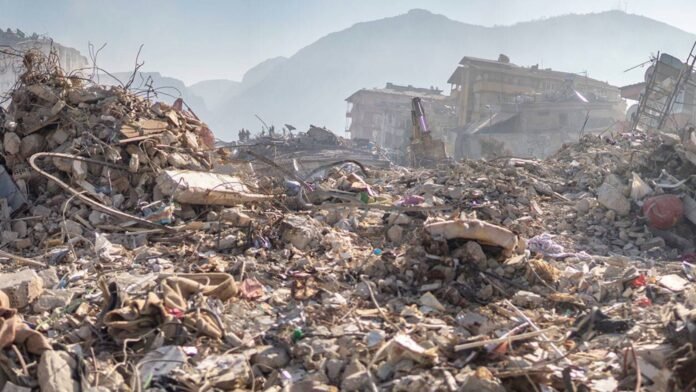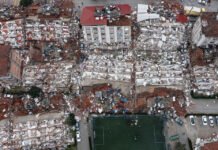A new expert report in a case concerning a housing complex that collapsed in earthquakes that struck Turkey on February 6, 2023 has for the first time assigned responsibility to Turkey’s Disaster and Emergency Management Authority (AFAD) and other public institutions, saying they failed to act on prior knowledge that the area was at high seismic risk, Turkish Minute reported, citing the Anka news agency.
The case concerns Arıkan Sitesi, a residential complex in Kahramanmaraş’s Onikişubat district, where 112 people were killed and five others injured when two blocks of the site collapsed during the twin earthquakes, which measured magnitude 7.8 and 7.5.
The earthquakes struck 11 provinces in the country’s south and southeast, killing 53,725 people and injuring more than 107,000, while leaving millions homeless after 518,000 homes collapsed, according to official data.
The report, prepared by a five-member panel comprising an architect, a city planner, a geology and geotechnical engineer and two civil engineers, was submitted to the case file at the Kahramanmaraş 4th High Criminal Court, where contractor Adnan Bektaşoğlu, structural engineer and technical supervisor Şener Yener and 17 municipal officials are standing trial on charges of “causing the death of more than one person by conscious negligence,” facing up to 22-and-a-half years in prison each. The next hearing is scheduled for March 17, 2026.
Citing AFAD’s 2020 Provincial Disaster Risk Plan (İRAP), the experts noted that the area flagged as a risky zone in the plan includes Arıkan Sitesi. According to the report the IRAP document explicitly warned that a major earthquake could impact the entire area, with liquefaction and high groundwater levels posing a serious threat to buildings.
The expert panel said that although the plan classified the ground conditions around the complex as high-risk, there was no evidence in the file that the agency, or any other provincial directorate or local authority that received the plan, had issued formal warnings, notified residents or requested a structural safety assessment for the site.
Despite IRAP’s conclusions, including its 7.5-magnitude earthquake scenario and warnings that detailed soil surveys should be carried out in residential areas and that buildings in hazardous zones should be evacuated, the expert report found that these measures were not implemented.
The report stated that AFAD’s Kahramanmaraş Provincial Directorate and the local directorates of the public institutions to which the IRAP was circulated, as well as local government officials, are “separately responsible” within the scope of their duties for failing to act on the known risk.
AFAD President Mehmet Güllüoğlu, Kahramanmaraş AFAD Provincial Director Aslan Mehmet Coşkun, Environment and Urbanization Minister Murat Kurum, Kahramanmaraş Metropolitan Mayor Hayrettin Güngör and Governor Ömer Faruk Coşkun were in office at the time the IRAP was prepared and introduced.
The new expert opinion is seen as a landmark in the February 6 earthquake trials because it does not limit culpability to contractors and project engineers but extends it to AFAD and other public bodies that, according to the report, had prior knowledge of the danger yet failed to take the necessary precautions. Legal observers say the findings could set an example for other ongoing cases stemming from the quakes.
More than two-and-a-half years on, justice remains elusive for many families who lost relatives in the earthquakes. Poor construction and weak enforcement of building codes in one of the world’s most seismically active regions have been widely blamed for the scale of the destruction.
Turkey, which is located on major fault lines and is frequently hit by powerful earthquakes, has a poor record in the delivery of justice for those who are responsible for the death of thousands in earthquakes due to shoddy construction.
After the 1999 İzmit earthquake, which killed more than 17,000 people, around 2,100 indictments were filed, but most trials stalled due to legal loopholes or time limits, and many defendants served only short terms or saw their cases dropped when the statute of limitations expired.
There is little hope that Turkey’s justice system will this time give a fair trial to those responsible for the collapsed buildings and satisfy the victims’ families’ quest for justice.















